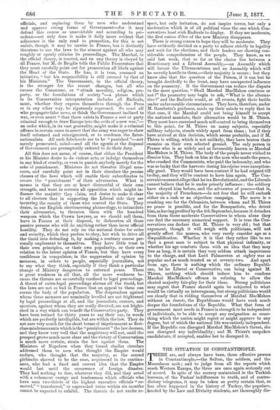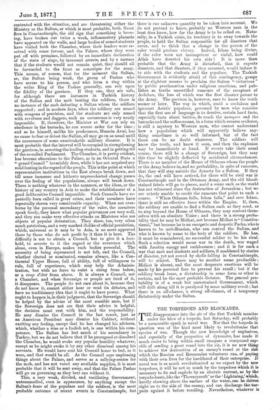THE SITUATION IN CONSTANTINOPLE.
THERE are, and always have been, three effective powers in Constantinople,—the Sultan, the soldiers, and the Mussulman mob ; and to judge from all the reports which reach Western Europe, the three are once again seriously out of accord. In spite of the secrecy maintained in the Turkish bureaus, of the Pashas' indifference to truth, and of contra- dictory telegrams, it may be taken as pretty certain that, as has often happened in the history of Turkey, the populace, headed by the Law and Divinity students, are thoroughly dis- contented with the situation, and are threatening either the Ministry or the Sultan, or which is most probable, both. Great fires in Constantinople, the old sign that something is brew- 1 ing, have broken out twice a week, inflammatory placards have appeared on the walls, and large bodies of armed students have visited both the Chamber, where their leaders were re- ceived with some favour, and the Palace, where they were put off with promises, followed by an immediate declaration of the state of siege, by incessant arrests, and by a menace that if the students would not remain quiet, they should all be forwarded to the front as conscripts for the army. This means, of course, that for the moment the Sultan, or, the Sultan being weak, the group of Pashas who have access to his person, and who form a ring within the wider Ring of the Pashas generally, can rely upon the fidelity of the garrison. If they can, they are safe, for although there are instances in Turkish history of the Sultan and the mob beating the soldiers, there is no instance of the mob defeating a Sultan whom the soldiers supported ; and in modern days, when the soldiery are armed with weapons of precision, and the students are only armed with revolvers and daggers, such an occurrence is very nearly impossible. If, therefore, the Minister at War can rely on obedience in the barracks, he can secure order for the time ; and as he himself, unlike his predecessor, Hussein Avni, has no cause to fear or detest the Sultan, all may go on as usual until the occurrence of some unmistakable military disaster. It is most probable that the interval will be occupied in strengthening the garrison, in arresting the leading students, and in getting rid of the so-called Parliament. The Chamber, it is pretty evident, has become obnoxious to the Palace, as in an Oriental State a " grand Council " invariably does, while it has not acquired any solid footing in the regard of the people. This is the point at which representative institutions in the East always break down, and till some immense and hitherto unprecedented change passes over the feeling of the populations, always will break down. There is nothing whatever in the manners, or the ideas, or the history of any country in Asia to make the establishment of a good deliberative Council impossible. Such Councils have re- peatedly been called in great crises, and their members have repeatedly shown very considerable capacity. When not over- borne by the personal ascendancy of the ruler, the members speak freely, they know what popular grievances are very well, and they can make very effective attacks on Ministers who are objects of popular detestation. They show, too, very often much patriotism, and a very marked dislike of official peculation, which, universal as it may be in Asia, is no more approved there by those who do not profit by it than it is here. The difficulty is not to obtain a Council, but to give it a foot- hold, to accrete to it the regard or the reverence which alone, even in Europe, makes such bodies powerful. The necessity of being represented is not felt, and the Council, whether elected or nominated, remains always, like a Con- tinental Upper House, full of ability, full of willingness to rule, full of experience, which may help the Adminis- tration, but with no force to resist a rising from below, or a coup d'e'tat from above. It is always a Council, not a Chamber, and when Sovereign or people are tired of it, it disappears. The people do not care about it, because they do not know it, cannot either hear or read its debates, and have no traditionary idea that it ought to have power. What ought to happen is, in their judgment, that the Sovereign should be helped by the advice of the most sensible men, but if the Sovereign does not see that their advice is helpful, the decision must rest with him, and the responsibility. He may dismiss the Council in the last resort, just as an American President may dismiss his Cabinet, without exciting any feeling, except that he has changed his advisers, which, whether a wise or a foolish act, is one within his com- petence. The Sultan has lost much of his ascendancy in Turkey, but we do not believe that if he prorogued or dissolved the Chamber, he would evoke any popular hostility whatever, except as he might evoke it by any other dismissal among his servants. He would have sent his Council home to bed, as it were, and that would be all. As the Council says unpleasing things about the Palace, and serves as a rallying-centre for the mob, and has not voted any available supplies, it is most probable that it will be sent away, and that the Palace Pashas will go on governing as they best can without it.
This, a very weak, divided, and vacillating Government, untrammelled, even in appearance, by anything except the Sultan's fears of the populace and the soldiers, is the most probable outcome of recent events in Constantinople, but there is one unknown quantity to be taken into account. We do not pretend to know, probably no Western man in the least does know, how far the Army is to be relied on. Natu- rally, in a Turkish crisis, its tendency is to sway towards the people, to hold the Sultan responsible for all disasters that occur, and to think that a change in the person of the ruler would produce victory. Indeed, Islam being divine, if the ruler were not incompetent or sinful, how could Allah have deserted his own side It is more than probable that the Army is disturbed, that it expects disasters, and that disasters, if they occurred, would induce it to side with the students and the populace. The Turkish Government is evidently afraid of this contingency, grasps at the slightest success to proclaim the Sultan " victorious " by public proclamation under religious sanctions, and pub- lishes as truths uncertified rumours of the recapture of Ardahan, the loss of which was the first disaster patent to the Army. The garrison is, however, sure to know the truth sooner or later. The way in which, amid a credulous and ignorant Asiatic populace, governed by men who consider that the first use of language is to deceive, certain hard facts, especially facts about battles, do reach the mosques and the barracks and the coffee-rooms, in a form which secures credence, is still a mystery to Western men, who cannot understand how a population which will apparently believe any- thing sometimes is so well informed, but of the fact there can be no doubt whatever. The soldiers will know the truth, and know it soon, and then the explosion may be immediately at hand. If events take their usual course, there will be a change of Sovereign, but they may this time be slightly deflected by accidental circumstances. There is no member of the House of Othman whom the people or the Army believe in, and no probability, in spite of rumours, that they will step outside the dynasty for a Sultan. If they do, the end will have arrived, for there will be civil war in Constantinople and in the Ottoman Army, and the old blood- stained fabric will go to pieces, amid a scene such as the world has not witnessed since the destruction of Jerusalem ; but we are utterly unable to credit the rumours that point to such a course. " When Othman falls, Islam falls," and save Islam, there is still no effective force within the Empire. If, then, the soldiery are unable to find a Sultan such as they need, or to step beyond the House of Othman, they may content them- selves with an absolute Vizier ; and there is a strong proba- bility that he may be Midhat, not because Midhat is" Constitu- tional," but because he is an energetic and despotic Pacha, who is known to be anti-Russian, who can control the Sultan, and who is known by name to the body of the soldiers. He has, it must be remembered, no successful soldier to be his rival. Such a selection would mean war to the death, war waged with Jacobin energy and ruthlessness ; and it is for such a war that mob and students and soldiers, if maddened by stories of disaster, yet not cowed by shells falling in Constantinople, will be athirst. There may be another name producible ; Midhat is absent, and the most desperate exertions will be made by his personal foes to prevent his recall ; but if the soldiery break loose, a dictatorship in some form or other is certain, and he the most probable dictator. The general pro- bability is of a weak but unrestrained Government, which will drift along till it is paralysed by some military revolt ; but there is an off-chance, a strong off-chance, of a temporary dictatorship under the Sultan.



































 Previous page
Previous page